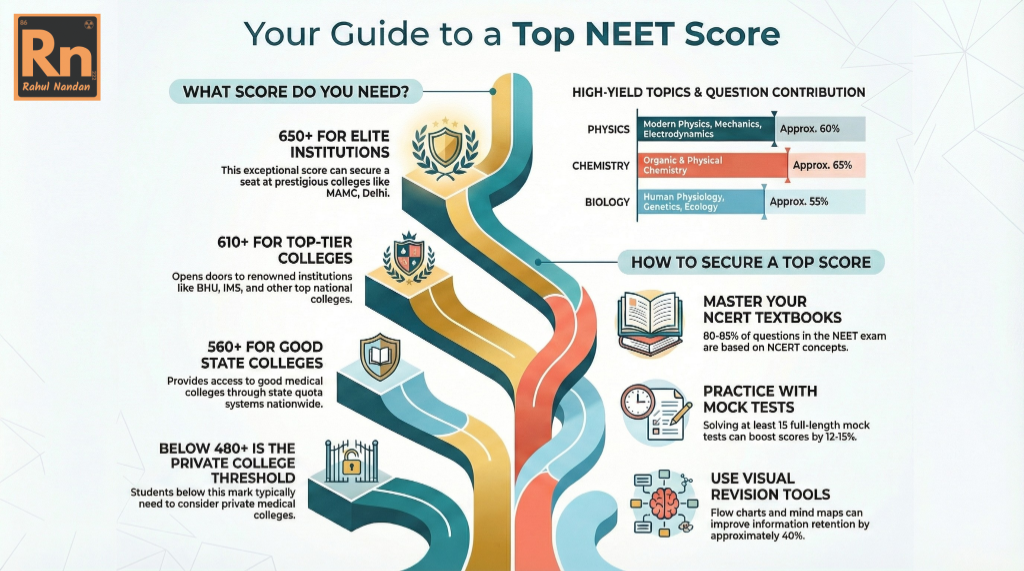There are no items in your cart
Add More
Add More
| Item Details | Price | ||
|---|---|---|---|
A Comprehensive Guide for Aspirants : Guideline and Roadmap By Expert
Fri Feb 21, 2025
"Success is no accident. It is hard work, perseverance, learning, studying, sacrifice, and most of all, love for what you are doing." – Pelé
This quote perfectly encapsulates the journey of NEET aspirants. Scoring well in NEET UG is not just about hard work but also about understanding what constitutes a "good score" to secure a seat in your dream medical college.
What is a Good Score in NEET UG?
The definition of a "good score" in NEET varies based on your aspirations, choice of college, and category. Generally, experts consider the following benchmarks when evaluating NEET scores:
 The data clearly indicates that aspiring for at least 600 marks gives candidates a strong chance at securing seats in premier medical institutions across India.
The data clearly indicates that aspiring for at least 600 marks gives candidates a strong chance at securing seats in premier medical institutions across India.
How to Secure a Good Score in NEET UG?
1. Develop a Structured Study Plan
A well-organized study schedule forms the foundation of NEET preparation. Dr. Anand Sharma, who has mentored over 500 successful NEET candidates, emphasizes: "The difference between average and exceptional performers lies in their approach to time management." Create a balanced timetable allocating appropriate time to each subject based on your strengths and weaknesses. The 2023 NEET topper Tanishka Kabra shared that she dedicated 3 hours daily to Biology, 2.5 hours to Chemistry, and 2 hours to Physics, with additional time for revision.
2. Master NCERT Thoroughly
NCERT textbooks remain the bible for NEET preparation. Nearly 80-85% of questions in the 2023 NEET examination were directly or indirectly based on NCERT concepts. Read each NCERT chapter at least three times – first for understanding, second for highlighting important concepts, and third for memorizing facts and figures. Make comprehensive notes while studying NCERT, especially for Biology, where diagrams and tabular information often feature in questions.
3. Regular Practice with Quality Questions
Solving previous years' questions (PYQs) and attempting mock tests significantly improves performance. The analysis of successful candidates shows that students who solved at least 15 full-length mock tests scored 12-15% higher than those who didn't. Dr. Rajesh Kumar, who has analyzed NEET patterns for over a decade, recommends: "Start with topic-wise questions, graduate to subject-wise tests, and finally take full-length mock tests in the last three months of preparation." Create a question bank of repeatedly asked concepts and revisit them weekly. Topics like Genetics, Modern Physics, and Organic Chemistry reactions deserve special attention due to their consistent appearance in exams.
4. Strategic Revision Techniques
Effective revision transforms information from short-term to long-term memory. Consider implementing spaced repetition techniques, where you revisit concepts at increasing intervals. The 2022 AIR-5 holder shared: "I maintained a revision notebook with formulae, reactions, and difficult concepts that I reviewed weekly. This regular reinforcement made recall effortless during the exam." Use mnemonic devices, flow charts, and mind maps to organize complex information. Research shows visual learning tools improve retention by approximately 40% compared to text-only revision.
5. Focus on High-Yield Topics
While comprehensive preparation is essential, allocating extra time to high-yield topics maximizes your score. Based on the last five years' analysis:
6 Maintain Physical and Mental Wellbeing
Maintain Physical and Mental Wellbeing Research published in the Journal of Educational Psychology found that students who maintained regular exercise and adequate sleep (7-8 hours) scored 12-15% higher in competitive exams compared to those with irregular routines. Dr. Raj Kumar, sports medicine specialist and educational counselor, advises: "A 30-minute daily walk, 10 minutes of meditation, and consistent sleep timings can significantly improve cognitive performance during preparation." Conclusion
Effects of Scoring Low Marks in NEET
Scoring below expectations in NEET can have several implications:
FAQs on NEET UG Score
1. Does the NEET percentile matter more than the absolute score?
While percentile reflects your relative performance, medical college admissions primarily consider your absolute score and rank. A high percentile doesn't necessarily guarantee admission if your absolute score falls below the college's cut-off.
2. Can I get a government medical seat with a score of 500?
Yes, depending on your category and state of domicile. Candidates from reserved categories or states with lower cut-offs can secure government seats with scores around 500. However, for general category students in competitive states, this score might be insufficient for government colleges.
3. How much do NEET cut-offs fluctuate year-to-year?
Analysis of the past five years shows NEET cut-offs typically fluctuate within a range of 10-30 marks depending on exam difficulty and competition. The 2023 cut-off for general category increased by 18 marks compared to 2022, reflecting the moderately easier question paper.
4. Is repeating NEET a good option if I score below expectations?
Repeating can be beneficial if your score is significantly below your potential. Statistics show that approximately 40% of repeaters improve their scores by 50+ marks. However, the decision should consider factors like age, alternative career options, and mental preparedness for another year of rigorous study.
5. How important are 11th standard topics in scoring well?
Very important. Approximately 45-50% of NEET questions come from 11th standard syllabus. Topics like Chemical Bonding, Cell Structure, and Mechanics form the foundation for many advanced concepts. Neglecting 11th standard preparation often leads to significant score reduction.
6. Do high scorers use special preparation techniques?
High scorers consistently report using active recall, spaced repetition, and regular self-assessment. They typically solve 30% more practice questions than average scorers and maintain detailed error logs to avoid repeating mistakes.
7. How much does guesswork affect the final score?
With negative marking of 1 mark for every incorrect answer, random guessing generally reduces scores. However, strategic elimination-based educated guesses on 8-10 questions can potentially add 5-10 marks to your final score, which can be crucial for rank improvement.
Conclusion
"यथा शिखा मयूराणां नागानां मणयो यथा। तद्वद्वेदाङ्गशास्त्राणां गणितं मूर्धनि स्थितम्॥"
(Just as the crest is to a peacock and the gem is to a snake, so is the knowledge of sciences crowned by persistent effort and measured success.)
This profound Sanskrit wisdom reminds us that while scores and ranks are important milestones, they represent just one aspect of your medical journey. True excellence in medicine comes from continuous learning, compassion, and dedication to patient care that extends far beyond entrance examination results.
With structured preparation, consistent effort, and strategic planning, achieving your desired NEET score becomes an attainable goal. The journey demands resilience, but as thousands of successful doctors have proven, the rewards of this noble profession make every challenge worthwhile.
Rahul Nandan Sir is mentoring NEET aspirants and produced many toppers under top 100 rank. Download his App from google Play Store and get Free Study Kit For NEET ( Where one can give 5 Full Syllabus Mock Test Free, along with other material) Downlaod the App.


Rahul Nandan
Chemistry Expert 🧪| Mentor to Top IIT-JEE, NEET, & Olympiad Achievers 🏆 | Facilitated admissions to MIT, IITs, AIIMS 🎓 | Toastmaster 🎤 | Warren Buffet Enthusiast 💼 | Orator 🗣️ | Music Aficionados🎵